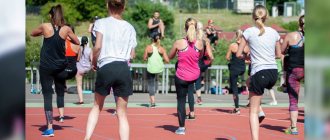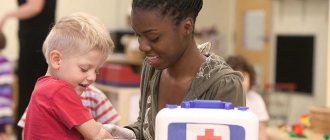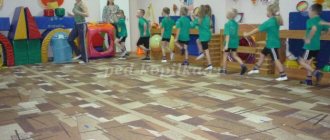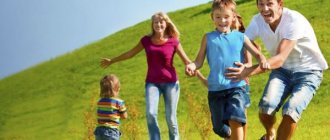Organization of active recreation for children in preschool educational institutions. Health days and holidays
Bibliographic description:
Kukushkina, M. A. Organization of active recreation for children in preschool educational institutions. Health days and holidays / M. A. Kukushkina. — Text: direct // Education and upbringing. — 2022. — No. 1 (16). — P. 18-20. — URL: https://moluch.ru/th/4/archive/81/3085/ (access date: 01/18/2022).
The article reveals the content of the educational cycle “health week in kindergarten” from the point of view of organizing physical education and health activities. The author gives recommendations for conducting traditional recreational activities, and also introduces new forms of organizing active recreation for children.
Key words : health days, health week, preschool education, holidays in kindergarten, active recreation, organization of physical education and recreational activities.
“Take care of your health from a young age” - this motto reflects the need to strengthen the health of a child from the first days of his life. Raising children healthy, strong, and emotional is the goal of every preschool institution.
One of the main tasks of physical education of preschool children is to improve the child’s body, increase its performance using a variety of forms and means of working with children. There are different forms of organizing physical education. Physical education instructors most often use physical education holidays and leisure time in their work; as well as health days and holidays.
It has long been known that the most effective form of organizing active recreation in a preschool institution is the introduction of health days or weeks. As a rule, in kindergarten it is customary to spend a health week in each season of the year. All classes are canceled on these days. The daily routine is filled with physical activity of children, sports games and exercises, musical entertainment, work in nature, artistic creativity, hiking, parents are invited. I would like to note that the health week is not the work of the physical education instructor exclusively; the entire kindergarten staff provides a complex of health-improving, educational and educational activities, the basis of which is motor activity.
Each day of the health week begins with a morning reception for children, which takes place in an entertaining, comic form. Children and parents are asked to complete various fun tasks before they get into the group: this could be an “obstacle course,” asking riddles about sports, and so on.
During health week, you can use a non-standard form of morning exercises, “Family exercises.” During this period, mothers and fathers, older brothers and sisters, as well as sports grandparents are invited. This “Family exercise” significantly improves the mood and strengthens the nervous system of children, charges them with vigor and positive emotions for the whole day; those children whose relatives try themselves as a physical education instructor are especially proud and happy. I would like to note the importance of this work from the point of view of establishing a trusting social partnership with the parents of the students. Parents begin to understand and accept the rules of the kindergarten more, trust teachers and specialists, and teachers, in turn, begin to count on the support of the families of their students. You can introduce an optional element into “Family Exercise” - a game with adults. In this case, the children themselves choose the game; they love to compete with moms and dads in speed and dexterity.
During the “Health” week, it is recommended to carry out hardening not in the form usual for children, but with the involvement of fairy-tale characters. These days, younger preschoolers are given certain hygienic knowledge in a theatrical form, and then the acquired skills are reinforced in the form of a game.
And older preschool children are asked to act as teachers themselves, asked to tell and show fairy-tale characters how to temper themselves with cool water and perform rubdowns.
Gymnastics of awakening together with a fairy-tale hero helps the child’s body not only wake up and increase muscle tone, but also improves mood. Children gradually move from sleep to wakefulness.
On health days and holidays, it is necessary to attach great importance to the physical activity of children on the street. These days, the physical education instructor, together with teachers, plans and conducts themed walks with a health and sports focus. The use of gaming pedagogical technologies allows you to fill a walk on the street with motor activity as effectively as possible. In younger groups, this is most often physical education activity involving outdoor games with an obligatory guest: a Fox, a Dog or a Bunny. Children play with the characters with great pleasure, without noticing that at the same time they are performing complex motor exercises. Children of senior preschool age are also offered non-standard outdoor activities during health weeks. More playful exercises and fun activities are selected for them in accordance with the central theme of the week. So, for example, in November, when the central theme is the Motherland, a hero from Russian folk tales (Ivan Tsarevich or Petrushka) comes to the children and competes with the children in performing traditional Russian games. In winter, as a rule, children are introduced to winter sports or the Winter Olympics are held.
But the most beloved and long-awaited events for children that take place during health week are, of course, physical education holidays and leisure activities in the afternoon. At the same time, children get the opportunity to show greater activity, independence and initiative in actions.
It is necessary to actively involve the families of pupils in physical culture and leisure activities. It is recommended to hold joint runs with parents, sports festivals, competitions, hiking trips, and organize photo exhibitions “My Sports Family.”
A traditional event for the kindergarten during health week is the cycle of sports festivals “Dad, Mom, I - a sports family!” Parents must be informed in advance about the program and time of upcoming events so that they can also actively participate in their preparation. Typically, families of pupils show great interest in issues related to the physical development and health of children. The family largely determines children’s attitude towards physical education, their interest in sports, activity and initiative. Children are especially susceptible to beliefs, the positive example of their father, mother, and family lifestyle.
One of the new forms of organizing active recreation can be the Festival of the All-Russian Physical Education Sports Complex GTO. Not only children, but also kindergarten teachers can take part and pass the standards in such a Festival. Experience shows that children are better involved in physical education and sports activities when their older friends - educators and specialists - train next to them shoulder to shoulder and fulfill the standards.
This motivates children very much, and even the seemingly least athletic children become little athletes in their persistence in achieving results. And for teachers, this is also a great motivation to keep themselves in sports shape.
A great time to organize active recreation for children in kindergarten is the holidays. For general education groups, vacations are organized in winter in the second week of January. And in the summer, from June 1 to August 31. And for children attending compensatory groups, additional holidays are introduced: in the first week of November and the first week of April. Their goal is to reduce the intellectual load of children, provide active recreation for children, promote healing and strengthening of the body in unity with the emotional and positive state of mind of preschoolers. During the holidays, activities related to the mental activity of children are canceled. Along with this, all organizational forms of physical education are widely used (morning exercises, daily physical education classes, etc.) and the time children spend in the fresh air is significantly increased.
I would also like to say about the summer period, because summer is an amazing and fertile time for organizing active recreation for children. This is due, first of all, to the fact that in the summer the number of indoor activities decreases, the daily routine is saturated with physical activity carried out in the open air, and it becomes possible to more effectively use the healing power of nature in the physical education system.
Active recreation activities (physical education holidays and leisure, health days) in kindergartens are planned by the creative team twice a year, when the annual work plan for the kindergarten and the plan for the summer health campaign are prepared.
Knowing that the diverse physical activity of children helps to improve health, increase the functional and adaptive capabilities of the body, and improve motor skills, it is important to remember that the main task of a physical education teacher in preschool childhood is to teach the child to experience the joy of movement.
Literature:
- Kopukhova N. N., Ryzhkova L. A., Samodurova M. M. Physical education teacher in preschool institutions. M.: Publishing house, 2002. pp. 198–199
- Runova M. A. Motor activity of a child in kindergarten. - M.: Publishing House, 2000. 12 p.
- Mashchenko M. V., Shishkina V. A. Physical education of preschool children. - Mn.: Urajai, 2000. 275 p.
- Shebeko V.N., Ovsyankin V.A., Karmanova L.V. Physical education! — Mn.: “Enlightenment”, 1997. 125 p.
- Mashchenko M.V., Shishkina V.A. What kind of physical education does a preschooler need? - Mn.: NM Center, 1998. 136 p.
Key terms
(generated automatically)
: health week, kindergarten, child, active recreation, health day, physical education, active recreation for children, physical education, form of organization, physical activity.
Project “Health Day in Kindergarten”
Municipal budgetary preschool educational institution "Kindergarten No. 3" of a combined type of urban settlement. Urussu Yutazinsky municipal district of the Republic of Tatarstan
Project " Health Day "
Project
participants - preschool teachers , preschool students, parents
Project implementation period : short-term (2 days )
Project type
: physical education
and health
Relevance
:
The problem of health and its preservation in modern society is more than acute. Phrases “ health-saving technologies ”
and “formation of
a healthy lifestyle ”
have taken a strong place in conversations with parents and children, in the plans of educational work of teachers of preschool institutions.
The first ideas about health and a healthy lifestyle are formed already in preschool age. It is during this period that intensive development of organs takes place, the formation of functional systems of the body, the basic personality traits are laid, character is formed, the attitude towards oneself and towards others. Currently, the task of preserving and strengthening the health of children , both physical and mental, introducing them to a healthy lifestyle and mastering modern health -saving technologies in our kindergarten is one of the most significant and priority. But the problem still remains relevant. How should you raise a child so that he understands the importance of health and knows how to treat it with care? (teachers and parents)
this problem from the earliest years of a child’s life, solving it systematically and together.
Objective of the project :
developing an interest in
a healthy lifestyle ,
one’s
health , movements and sports.
Project objectives :
1. To consolidate children’s knowledge about the concept of “ health ”
.
2. Clarify the rules for maintaining health .
3. Develop an interest in your own body, well-being, and mood related to your health .
4. Strengthen the rules of the hostel related to preserving the health of other people.
5. Satisfy children’s natural need for movement.
6. Instill in children a conscious attitude towards the need to toughen up and play sports.
Plan
project implementation :
1. Preparatory stage
- group design in accordance with the theme of the day;
— preparation of information for parents “ Health is the head of everything ”
;
— develop symbolism for the day;
- for groups, come up with a team name and motto.
— develop a thematic plan for working with children during the day (content of the valeology hour, activities in the physical education corner, formation of the group of children, productive activities, etc.);
— make medals, attributes, update non-standard equipment in the corners, didactic valeology games and manuals;
— preparation of fiction about sports, physical education, healthy lifestyles, etc. d.;
- learning “chatters”, sayings, proverbs, riddles, songs on sports topics;
- looking at illustrations depicting different sports.
- conversations and activities with children about a healthy lifestyle , about maintaining health ,
healthy food and vitamins.
2. Main stage
(practical implementation
of the project )
“Morning of joyful meetings” (receiving children in a festive atmosphere, greeting each other, compliments, wishes)
Conversations with children “About health ”, “ A healthy mind in a healthy body ”.
To form in children sustainable motivation for a healthy lifestyle and the formation of a culture of health .
Morning exercises “ Health is good . Thanks to the charger." Set up your body with positive energy and vigor for the whole coming day .
"Breakfast of the Champion"
"Journey through the country of health "
— valeological hour
(conversations about healthy lifestyle, didactic valeological games)
.
Develop an interest in your own body, well-being, and mood related to your health .
" Health is a magical land "
- reading fiction; learning proverbs and sayings about health; looking at illustrations and photographs. To instill in children a conscious attitude towards the need to toughen up and play sports.
Modeling “Fruits and vegetables”
.
Drawing "Microbes on the palms."
Preparing a vitamin dish “Vitamin Family”.
Competitions: “Clean”
,
“Clean Plate”
,
“Sleepyhead”
.
Competitions between senior groups: “Fun Starts”
.Satisfy children's natural need for movement.
"Olympian's Lunch"
Awakening gymnastics: “Who sleeps sweetly in bed? It's high time to get up. Hurry up to exercise, we won’t wait for you!”
The gradual transition of children from sleep to wakefulness.
Afternoon snack: “One, two, three – refresh yourself, then go in for sports.”
Create a need for a healthy lifestyle .
Overcoming the "Obstacle Course"
.
3. Final stage
— Collect children's comments and statements about Health .
— Exhibition of children's drawings: “Journey to the land of health ”
;
— Provide information and photographic materials to the preschool educational institution website.
Expected results:
— Increasing the pedagogical skills of teachers in matters of physical development and valeological education, developing greater attention to the organization of health-improving work in groups of preschool educational institutions
-Increasing the stock of valeological concepts, cognitive and communication skills of preschoolers on the topic of the project .
— Increasing the interest of parents in maintaining a healthy lifestyle for themselves and their child
Throughout the day, the project implements various forms of education and health improvement for children, taking into account individual age characteristics, interests, existing knowledge about a healthy lifestyle , skills and abilities.
Joint activity under the guidance of a teacher forms in children the most valuable moral and volitional qualities: feelings of collectivism, friendship, mutual assistance, develops endurance, attention, courage, perseverance, discipline.
This project should show that physical education and health work in various types of activities and routine processes of the preschool educational institution provides sufficient physical activity at the same time for all children and increases the endurance of the child’s body. Movement improves health and helps relieve stress.
Recommendations for celebrating Health Day
- All competitions, quizzes, and exercises must take into account the age characteristics of children.
- Be sure to alternate physical activity with rest or quiet games.
- Do not overload the psychophysical state of children.
- Conduct a preliminary conversation with children about the rules of Health Day.
- Attributes should not contain sharp, piercing elements to avoid injury.
- The venue (hall, area) must be safe for children.
- Compliance with the mandatory routine moments of a preschooler’s day.



